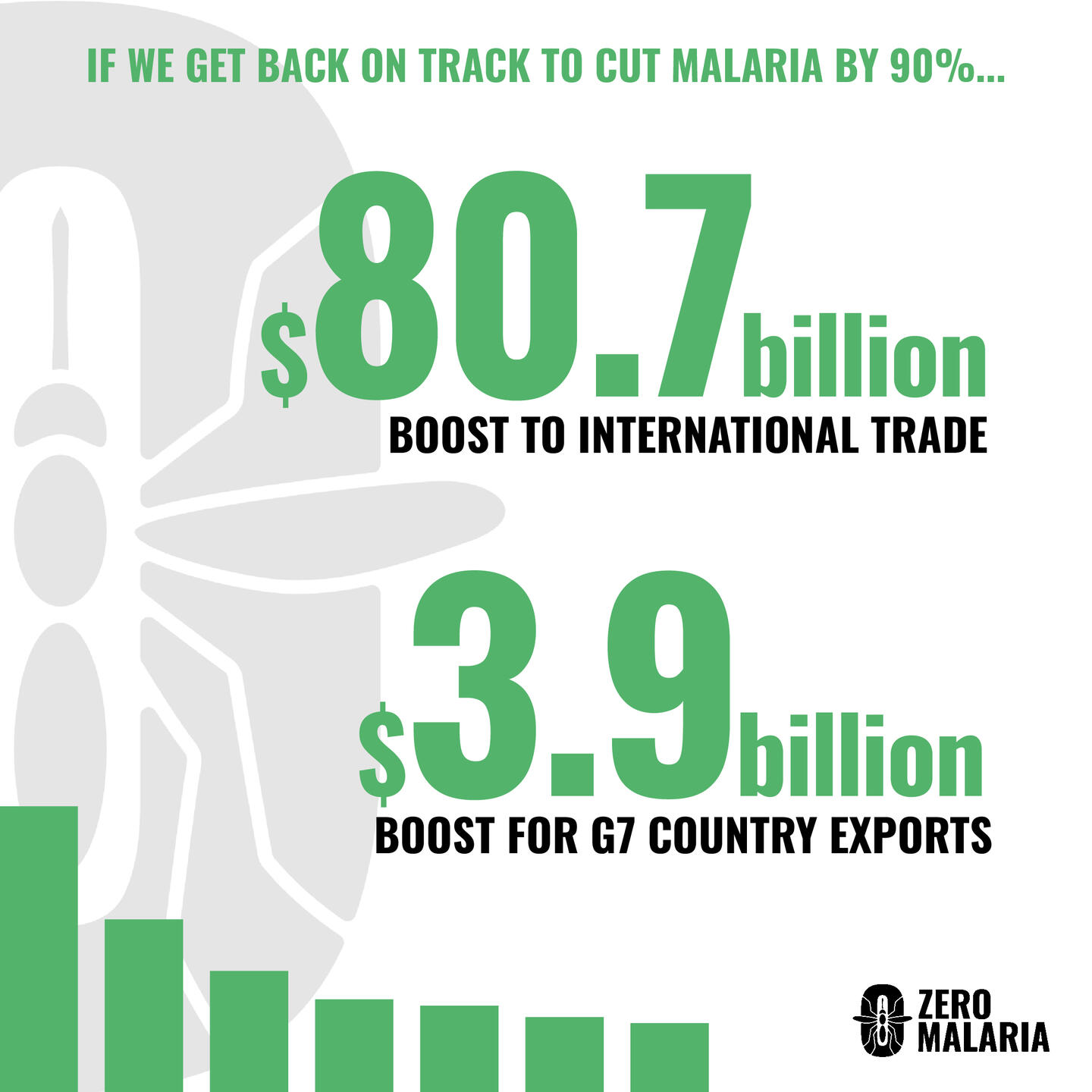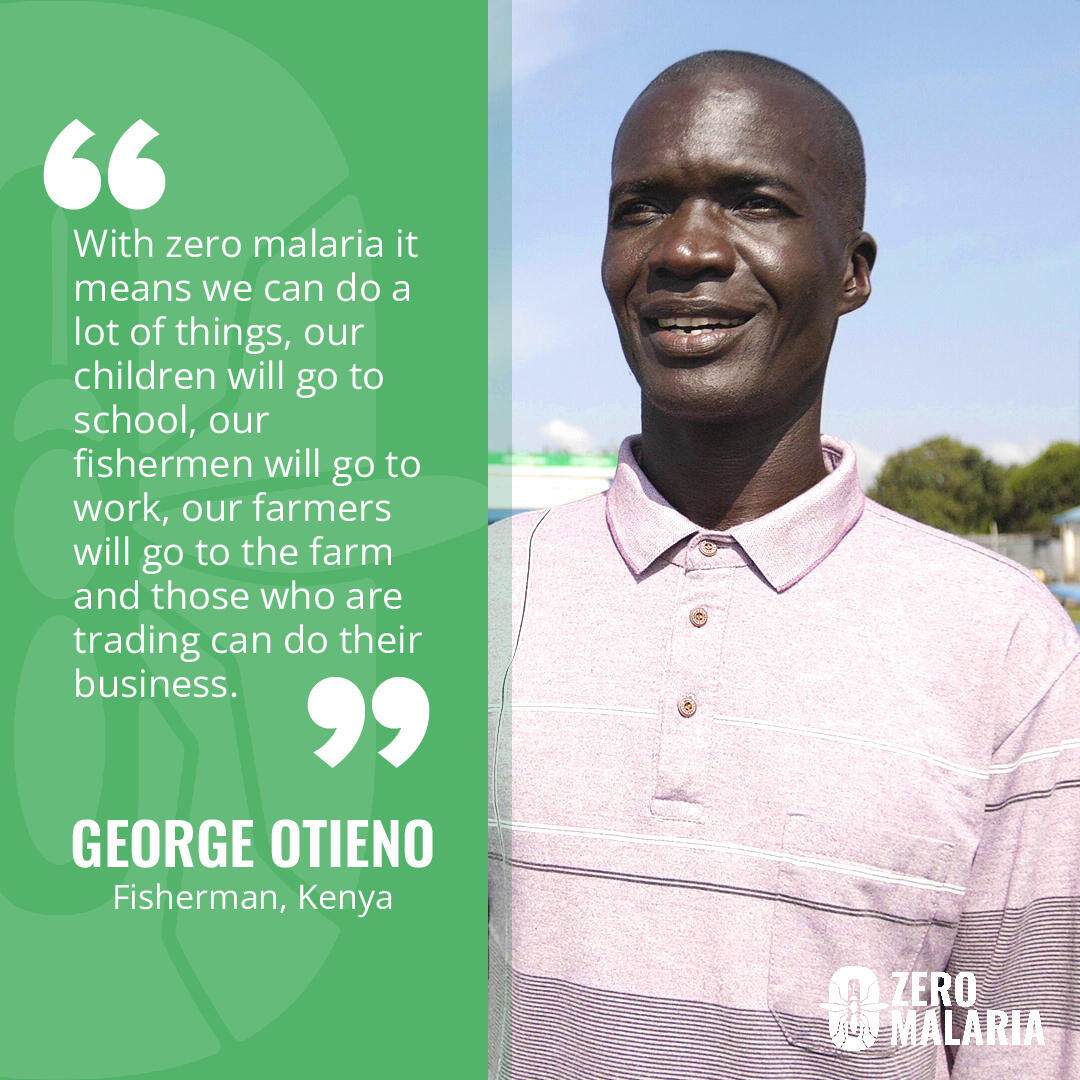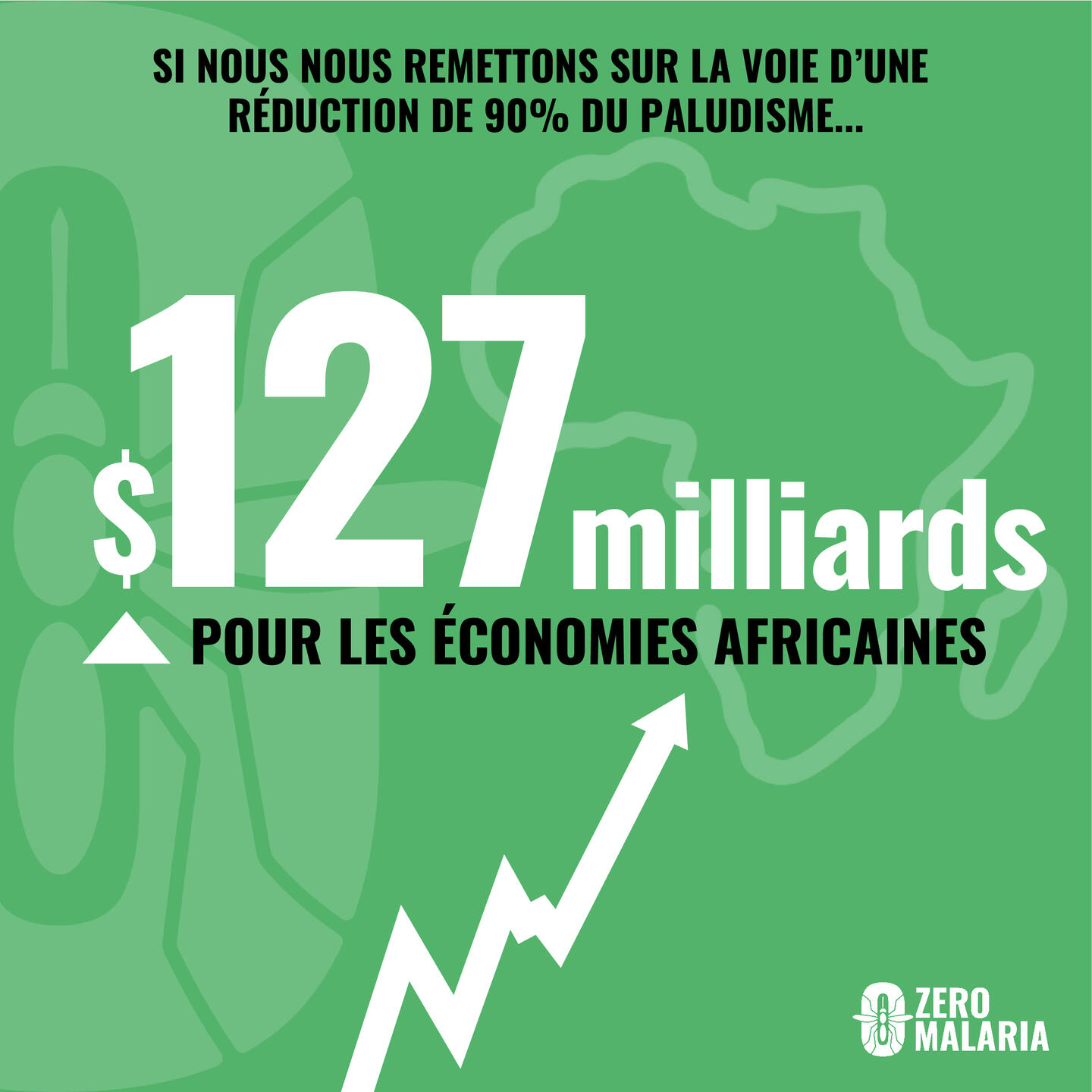The Malaria Dividend: WHY INVESTING IN MALARIA ELIMINATION CREATES RETURNS FOR US ALL

It’s time to realise the benefits that eliminating malaria can deliver
New research reveals that achieving the Sustainable Development Goal target of cutting malaria by 90% by 2030 could significantly boost the GDP of malaria-endemic countries by US$142.7 billion.The research also showed reaching this goal could generate an additional $31bn in exports to some of the most affected malaria endemic countries in Africa; with an almost $4bn rise for G7 countries.Despite huge progress over the last 20 years, malaria still claims the lives of over 600,000 people each year. The majority of them are children under five years of age. The report shows that sticking to business as usual not only costs the lives and well-being of millions, it leaves billions of dollars of economic progress unrealised.With a steadfast commitment from world leaders for the Global Fund and Gavi and with continued investment and support of malaria research, we will not only save lives but boost economic growth for a stronger, safer world.
SUGGESTED SOCIAL MEDIA POSTS
Use the example posts and assets below to share the campaign message and make some noise on social media.
Twitter/X
💸Getting back on track to cutting malaria by 90% could boost African economies by $127bn by 2030. This important new report shows we can save lives, boost economies and trade, creating a healthier world #ZeroMalaria. Find out more 👉https://bit.ly/3wNvmDD
🌍New analysis shows investing in ending malaria will save millions of lives, grow African economies, and boost trade for G7 countries. G7 leaders should invest in the @globalfund and @gavi to get the malaria fight back on track. Find out more 👉https://bit.ly/3wNvmDD
📈New analysis shows African economies could be $16bn a year bigger if we cut malaria by 90% by 2030. That's larger than Niger’s entire economy today. But we need investment and commitments from leaders. Let’s save lives and boost economies. Find out more👉https://bit.ly/3wNvmDD
💵A new report shows getting back on track to cutting malaria by 90% by 2030 could generate an extra $31bn in trade to Africa. G7 countries will benefit too with exports rising by $4bn. We can save millions of lives and boost economies. Find out more👉https://bit.ly/3wNvmDD
LinkedinA new report shows that by getting back on track and cutting malaria by 90% by 2030 we could boost African economies by $127bn and increase exports to Africa by $31bn. G7 countries will also benefit with exports to Africa increasing by $4bn.By investing in the upcoming replenishment of @gavi and the @globalfund we can get the malaria fight back on track. Together we can save millions of lives, grow economies, and bolster global health security – protecting us from future pandemics. With new malaria vaccines and next-generation bed nets and treatments ready to go, there’s no better time to renew our commitment to ending one of the world’s oldest and deadliest diseases. #ZeroMalaria
Read the report in full👉https://bit.ly/3wNvmDD
MALARIA'S IMPACT ON COMMUNITIES
George Otieno is a father, fisherman and community leader for sanitation and environmental health, from a vibrant fishing village on the shore of lake Victoria in Kisumu county, Kenya.George knows first-hand the impact of malaria through the devastating effect on his family and wider community — and what we have to gain by ending this disease.
CONTENU DES MÉDIAS SOCIAUX EN FRANÇAIS
💸En se remettant sur la voie d'une réduction de 90 % du paludisme, on pourrait dynamiser les économies africaines à hauteur de 16 milliards de dollars par an. Ce nouveau rapport important montre que nous pouvons sauver des vies, stimuler les économies et le commerce, créant ainsi un monde plus sain #ZéroPalu. Pour en savoir plus 👉https://bit.ly/3KqYsvu
COUNTRY SPECIFIC SOCIAL MEDIA POSTS
MALARIA ENDEMIC COUNTRIES
Angola
A new report shows that by getting the malaria fight back on track we could grow Angola’s economy by $8.5bn by 2030, and increase the African economies by $127bn. Let’s save lives and boost prosperity #ZeroMalaria. Find out more👉https://bit.ly/3wNvmDD
Burkina Faso
A new report shows that by getting the malaria fight back on track we could grow Burkina Faso’s economy by $1.7bn by 2030, and increase the African economies by $127bn. Let’s save lives and boost prosperity #ZeroMalaria. Find out more👉https://bit.ly/3wNvmDD
Côte d’Ivoire
A new report shows that by getting the malaria fight back on track we could grow Côte d’Ivoire’s economy by $7.5bn by 2030, and increase the African economies by $127bn. Let’s save lives and boost prosperity #ZeroMalaria. Find out more👉https://bit.ly/3wNvmDD
DRC
A new report shows that by getting the malaria fight back on track we could grow the DRC’s economy by $4.9bn by 2030, and increase the African economies by $127bn. Let’s save lives and boost prosperity #ZeroMalaria. Find out more👉https://bit.ly/3wNvmDD
Ghana
A new report shows that by getting the malaria fight back on track we could grow Ghana’s economy by $6.4bn by 2030, and increase the African economies by $127bn. Let’s save lives and boost prosperity #ZeroMalaria. Find out more👉https://bit.ly/3wNvmDD
Kenya
A new report shows that by getting the malaria fight back on track we could grow Kenya’s economy by $9.4bn by 2030, and increase the African economies by $127bn. Let’s save lives and boost prosperity #ZeroMalaria. Find out more👉https://bit.ly/3wNvmDD
Mali
A new report shows that by getting the malaria fight back on track we could grow Mali’s economy by $1.8bn by 2030, and increase the African economies by $127bn. Let’s save lives and boost prosperity #ZeroMalaria. Find out more👉https://bit.ly/3wNvmDD
Mozambique
A new report shows that by getting the malaria fight back on track we could grow Mozambique’s economy by $2.1bn by 2030, and increase the African economies by $127bn. Let’s save lives and boost prosperity #ZeroMalaria. Find out more👉https://bit.ly/3wNvmDD
Niger
A new report shows that by getting the malaria fight back on track we could grow Niger’s economy by $1.5bn by 2030, and increase the African economies by $127bn. Let’s save lives and boost prosperity #ZeroMalaria. Find out more👉https://bit.ly/3wNvmDD
Nigeria
A new report shows that by getting the malaria fight back on track we could grow Nigeria’s economy by $35bn by 2030, and increase the African economies by $127bn. Let’s save lives and boost prosperity #ZeroMalaria https://bit.ly/3wNvmDD
Tanzania
A new report shows that by getting the malaria fight back on track we could grow Tanzania’s economy by $7.4bn by 2030, and increase the African economies by $127bn. Let’s save lives and boost prosperity #ZeroMalaria. Find out more👉https://bit.ly/3wNvmDD
Uganda
A new report shows that by getting the malaria fight back on track we could grow Uganda’s economy by $4.1bn by 2030, and increase the African economies by $127bn. Let’s save lives and boost prosperity #ZeroMalaria. Find out more👉https://bit.ly/3wNvmDD
Zambia
A new report shows that by getting the malaria fight back on track we could grow Zambia’s economy by $2.2bn by 2030, and increase the African economies by $127bn. Let’s save lives and boost prosperity #ZeroMalaria. Find out more👉https://bit.ly/3wNvmDD
Text
G7 COUNTRIES
Canada
A new report shows that getting the malaria fight back on track will not only save lives, but boost economies and increase global trade, helping Canada’s exports to rise by $123mn by 2030. Let’s save lives and boost prosperity #ZeroMalaria. Find out more👉https://bit.ly/3wNvmDD
France
A new report shows that getting the malaria fight back on track will not only save lives, but boost economies and increase global trade, helping France's exports to rise by $634mn by 2030. Let’s save lives and boost prosperity #ZeroMalaria. Find out more👉https://bit.ly/3wNvmDD
Germany
A new report shows that getting the malaria fight back on track will not only save lives, but boost economies and increase global trade, helping Germany’s exports to rise by $485mn by 2030. Let’s save lives and boost prosperity #ZeroMalaria. Find out more👉https://bit.ly/3wNvmDD
Italy
A new report shows that getting the malaria fight back on track will not only save lives, but boost economies and increase global trade, helping Italy’s exports to rise by $283mn by 2030. Let’s save lives and boost prosperity #ZeroMalaria. Find out more👉https://bit.ly/3wNvmDD
Japan
A new report shows that getting the malaria fight back on track will not only save lives, but boost economies and increase global trade, helping Japan’s exports to rise by $405mn by 2030. Let’s save lives and boost prosperity #ZeroMalaria. Find out more👉https://bit.ly/3wNvmDD
South Korea
A new report shows that getting the malaria fight back on track will not only save lives, but boost economies and increase global trade, helping South Korea’s exports to rise by $362mn by 2030. Let’s save lives and boost prosperity #ZeroMalaria. Find out more👉https://bit.ly/3wNvmDD
United Arab Emirates
A new report shows that getting the malaria fight back on track will not only save lives, but boost economies and increase global trade, helping the UAE’s exports to rise by $896mn by 2030. Let’s save lives and boost prosperity #ZeroMalaria. Find out more👉https://bit.ly/3wNvmDD
United Kingdom
A new report shows that getting the malaria fight back on track will not only save lives, but boost economies and increase global trade, helping the UK’s exports to rise by $453mn by 2030. Let’s save lives and boost prosperity #ZeroMalaria. Find out more👉https://bit.ly/3wNvmDD
United States
A new report shows that getting the malaria fight back on track will not only save lives, but boost economies and increase global trade, helping the US’ exports to rise by $1.5bn by 2030. Let’s save lives and boost prosperity #ZeroMalaria. Find out more👉https://bit.ly/3wNvmDD
Key messages
ECONOMIC BENEFITSInvesting more in the fight to end malaria will save millions of lives, grow African economies and boost trade for G7 countries and across the world.HEALTH SECURITYEconomic growth driven by lower malaria rates will allow greater funds to bolster public spending. These can be invested in health systems and by doing so, governments will be able to strengthen the health security of Africa and the whole global community.GLOBAL TRADEIncreased economic growth in malaria- endemic countries could lift trade from, between and into African economies. This trade boost could enable key countries to expand their life sciences capabilities, accelerating efforts towards ending malaria and other diseases.VACCINES AND OTHER TOOLSIt is vital that the malaria vaccines are rolled out in combination with other tools such as ‘next generation’ bed nets and reach all those that need them. In doing so, not only will lives be saved but economic benefits to the whole world could be realised.CALL TO ACTIONG7 and malaria-endemic countries should work hand in hand to drive greater investment in tackling malaria, through their domestic funding and through investments in Gavi and The Global Fund. These investments will save lives, unlock prosperity and strengthen health security.
Q&A
Discover more about the report and its findings below.Q: How was the research conducted?A: The research was commissioned Malaria No More UK, a partner to, and in support, of the RBM Partnership to End Malaria, and conducted by Oxford Economics Africa (OEA). OEA employed a robust methodology to quantify the potential economic benefits of achieving the 2030 malaria targets. This involved analysing data on malaria case incidence, GDP growth, and international trade projections over the 2023-2030 period. The findings were then extrapolated to estimate the economic impact of malaria reduction efforts at country, regional, and global levels. A full methodology can be found here.Q: What does the research tell us?A: The research tells us that investing in malaria reduction efforts can yield significant economic benefits, including boosts to GDP and international trade. By achieving the 2030 malaria targets, countries stand to gain billions of dollars in GDP growth and trade opportunities.Q: How does this research add to existing research?A: This research adds to existing research by providing updated projections and insights into the economic impact of malaria reduction efforts. It builds upon previous studies by incorporating the latest data on malaria incidence, economic trends, and research and development funding. Additionally, it emphasises the importance of comprehensive approaches to malaria control and the role of international collaboration in achieving global health goals.Q: How do we get back on track to reaching the 2030 malaria targets?A: To get back on track to reaching the 2030 malaria targets, it is essential to prioritise investments in malaria control efforts, strengthen health systems, and foster international cooperation. Strengthened domestic resource mobilization, as recognized in the Yaoundé declaration, launched in March 2024i following the Ministerial conference on malaria, will be crucial. This ministerial level declaration acknowledges the vital role that domestic resource mobilisation and political will must play in driving down the malaria burden, and calls for both endemic countries and donors to step up their commitments.This includes fully funding organisations like the Global Fund and Gavi, supporting research and development initiatives, and implementing comprehensive malaria control programmes. Additionally, addressing underlying social determinants of health, such as poverty and inequality, is crucial for sustaining progress in the fight against malaria.Through collective action and sustained commitment, we can accelerate progress towards ending malaria and achieving a malaria-free future by 2030. With the strengthened domestic resource mobilisation committed to by ministers in Yaoundé, a renewed commitment to the Global Fund and Gavi replenishments from G7 governments and other donors, and continued investment and support to the malaria research and development pipeline, it is not just possible to save the lives of millions, but also to strengthen the world's resilience against future pandemics and boost economic growth.Q: What are the key findings of the report?A: The report highlights the significant economic benefits of investing in malaria reduction efforts. It reveals that achieving the 2030 malaria targets could lead to a boost in Africa's GDP by $126.9 billion and a global boost of $142.7 billion cumulatively over the 2023-2030 period.Q: Where can I access the data?A: The data can be accessed here.Q: How does malaria impact economic growth?A: Malaria places a heavy economic burden on affected countries by stunting socioeconomic progress, increasing healthcare costs, and reducing productivity. Families facing malaria often incur catastrophic expenses on treatment, hindering investments in education and economic activities. By reducing malaria incidence, countries can unlock economic potential, improve productivity, and foster sustainable development.Q: How can investments in malaria control benefit trade and economic growth?A: Investments in malaria control not only save lives but also create opportunities for economic growth and increased trade. By reducing the disease burden, countries can improve workforce productivity, lower healthcare costs, and attract investment. Additionally, ending malaria enhances trade prospects by fostering stable and prosperous markets, benefiting both malaria-endemic countries and trading partners like the G7.Q: What are the recommendations from the report?Fully fund The Global Fund to Fight AIDS, Tuberculosis and Malaria and Gavi, The Vaccine Alliance: All donors, and particularly the G7 governments, should commit to fully financing both the Global Fund and Gavi at their upcoming replenishments in 2024/25, supporting and enhancing the investments made by malaria-endemic countries themselves. These organisations play indispensable roles in the fight against malaria, and their work must be fully supported to ensure effective malaria control and immunisation efforts reach those who need them most.Support and deliver on the promise of the Yaoundé declaration. Malaria-endemic countries, supported by donors and global partners, should ensure that the necessary domestic resource mobilisation and political will to drive down malaria are prioritised.Recognise the link between economic development, global health security and malaria elimination: G7 countries can use this year’s G7 leaders’ summit, as well as meetings of health, trade and development ministers, to recognise that malaria elimination is core to both social and economic progress.
About Zero Malaria
We’re a global movement, born out of the grassroots pan-African campaign Zero Malaria Starts with Me, that is committed to ending malaria in a generation.Together we are lifting the voices of people impacted by malaria, connecting communities with leaders and providing platforms and campaigns that unite everyone in solidarity to end malaria, one of the world’s oldest and deadliest diseases.




